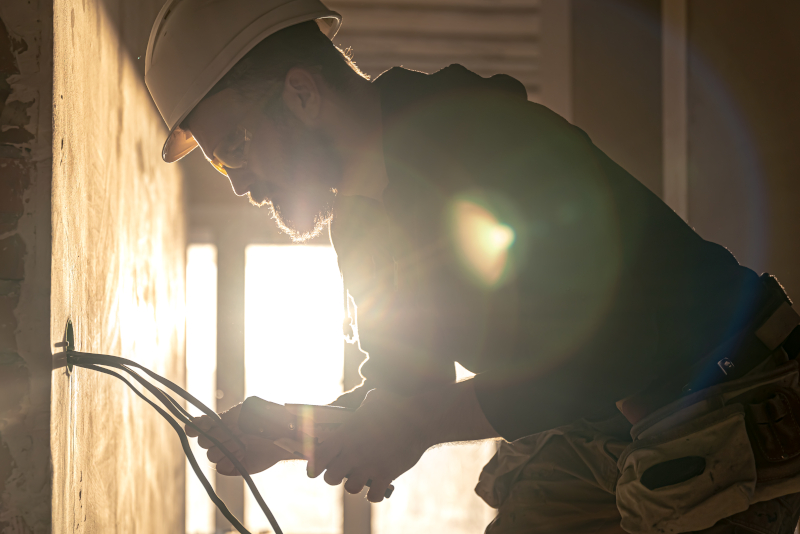Wonderful service from start to finish.

Having work carried out on our homes can be an exciting yet scary thought. We often hear stories about cowboy builders and home renovations that have gone wrong, which can put unsettling thoughts into anyone planning to improve their homes. The good news, however, is that you are not alone. According to Property Reporter, almost 41% of homeowners in the UK planned to undertake home improvements this year.
Unfortunately, disputes with third-party contractors happen, and it's sometimes unavoidable, often because, as humans, we have different levels and interpretations of satisfactory standards.
So what happens if you find yourself in the middle of a dispute with a builder? The most important thing is to stay calm (which can often be easier said than done.) We always recommend resolving the dispute privately, as it's cheaper for both parties involved. If both parties cannot resolve the dispute, we suggest seeking legal guidance from an accredited solicitor or Citizens Advice.
If you are unsure where you stand or what to do with your ongoing dispute, we have outlined some common questions that may help you.
The five most frequently asked questions over construction and building contracts
1) Do I have a Contract with my builder?
Although there may not be a formal document titled "The Contract" present, it's never safe to assume there isn't a contract in place. In fact, this is typically absent within small building and construction projects (£25,000 or less in value). Many contractors incorporate standard terms and conditions that refer to their quotations. This usually means all the necessary elements of a contract are present.
Contracts can also occur in various other ways. For example, contracts can be entirely verbal, although these can be difficult to prove. Contracts can also compose in any form of documented messaging such as an exchange of emails or text messages. Lastly, contracts can be a combination of all the above examples listed.
There is no prescribed form in which a contract comes into being or is documented. If you have an agreement with a builder to complete the works you are paying for, it's likely there is a contract in place. Obtaining an official written contract before any work begins is always best. There are many standard forms of contracts available for building and construction work.
2) Can the builder walk away from a job?
If a builder stops work before completing the job, they will likely be liable for damages equal to any cost over the agreed price specified. However, there are a couple of circumstances where they may be able to walk away. We recommend seeking legal advice before taking action.
If the builder is not allowed to return to the site to finish the contract, the matter is likely over, and the builder need not to return. Sorting out who was at fault will have to be decided later on. It is best to seek immediate legal advice.
3) The other party wants to resolve the dispute. Does this mean I can't raise further issues with them in the future?
A negotiated settlement is usually the cheapest and best way of avoiding a dispute. If you have managed to do a deal, then great! You are on the right track.
It's vital that any deal made is recorded in writing and sent to the other party. The written agreement must be drafted carefully and state what is being settled and on what basis. If the agreement resolving the issue is not in writing, you may be able to raise further disputes in the future.
If you are worried about achieving the correct terms on a settlement, we advise seeking legal advice.
4) We are looking for building work, and my builder wants a large deposit upfront. Should I agree to it?
Most reputable builders will not ask you for a large deposit upfront. The contract should have sufficient cash flow in their business to purchase the necessary materials and start work.
If a builder does not have the cash flow to begin work, you should ask yourself why? Paying out a large upfront deposit could leave you at risk, especially if they don't complete the job as agreed.
You could take legal action against them, however, it's unlikely they could pay the additional legal costs incurred to you. In addition, these upfront payments are, at best, unsecured debts, and if the builder becomes insolvent, you are looking at recovering around 1p/2p to the pound. We suggest you dodge this complication and avoid paying a large deposit upfront.
5) Are stage payments a good idea?
Like all procedures, you can adopt stage payments, but they are only good if operated correctly.
Important considerations:
- Avoid large upfront payments.
- Ensure each stage is linked to the progress of the works – e.g. £XX.XX is due after the walls are up, £YY.YY is required after the plastering is complete, and so on.
- Pay each stage payment if the qualifying conditions are met. If not, withhold the money until the stage has been completed correctly.
- Refrain from relying on what you are told. Inspect the works yourself, and make sure a sufficient amount of money is in the final stage payment to motivate the builder to finish the job.
These are just a few of the most common questions asked by our clients. If you would like more information or assistance in settling your dispute, please get in touch with our litigation team.
- Phone: 02380 717482
- Email: andrewcullyer@warnergoodman.co.uk
This is not legal advice. It is intended to provide information of general interest about current legal issues.

